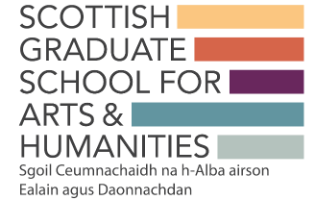Research Showcase Launch Event
Thursday 23rd of June
5.30pm - 7pm
Circulation space; level 3 mezzanine, University of Strathclyde, TIC Building, 99 George St, Glasgow G1 1RD

SGSAH is hosting its annual Doctoral Research Showcase to illustrate the innovative research being undertaken by arts & humanities doctoral researchers across Scotland. All are welcome to attend.
Meet the Exhibitors
Rhoda Ellis (University of Dundee)
Thinking through {Virtual} Making: Sculpting digital materials with virtual hands
Rhoda Ellis is a Sculptor and Creative Producer whose practice-based research focuses on the Post-Human Condition. She makes works that invites one to question the existential themes of the Self, the Other and Being-in-the-{Virtual}World. Her first degree was in Neuroscience, and she has another in Art, Philosophy and Contemporary Practice. Her current research, entitled 'Thinking Through {Virtual} Making: Sculpting digital materials with virtual hands', draws comparison between how we make digital-born artworks and those made by more traditional methods. Her practice combines several disciplines including Virtual Reality, motion capture, traditional figurative sculpting, photogrammetry and digital fabrication. Through her artworks she reflects on how we are ourselves change by our interactions with emerging technologies both as artist and audience. Rhoda is funded by an Applied Research Collaborative Studentship between DJCAD at The University of Dundee and Abertay University. Her industry partner is the Glasgow-based motion capture artist John Butler.
Charley Matthews (University of Edinburgh)
The Queer Woman Reader in the Nineteenth Century
Charley Matthews is a second-year AHRC-funded PhD researcher at the University of Edinburgh. Their thesis examines the reading practices of queer women and gender-nonconforming people in the nineteenth century, working with the diaries, letters, and book reviews of Anne Lister, Geraldine Jewsbury, and Mary Diana Dods, among others. Charley has contributed transcriptions of Anne Lister’s diary pages for online publication as part of the Lister transcription project, and they are currently building a digital database of Lister’s reading habits that will be made available open-access upon completion. They have previously presented at SHARP’s 2021 conference “Moving Texts,” at “Gender and the Book Trades” at the University of St Andrews, and at the CHAPTER seminar series at the Institute of English Studies. Their research interests also include publishing history, digital humanities, narratology, and the early nineteenth-century novel. Charley is employed as a reader for the James Tait Black prize for biography.
Garry McLaughlin (University of Dundee)
Queer Temporality in Comics and Graphic Novels
Garry (Mac) McLaughlin is a queer writer, illustrator and PhD researcher from Glasgow. He recently displayed work in Gallery of Modern Art Glasgow and co-directed a short film with Michael Lee Richardson, funded by BBC NowNext and LUX Scotland, both of which were related to his Masters study in queer temporalities. He is now undertaking a SGSAH-Funded PhD with University of Dundee researching queer time in comics with a practical element, a comic called PRAXIS. The research is both practice-based, in the sense that practical creative work will attempt to actualise the suppositions of the thesis, and also practice-led, in the sense that the work on queer temporality shapes his approach to his practice throughout, developing work in a rhizomatic, non-linear way.
Alyssa Osiecki (University of Glasgow)
Hear Us Now: Reimagining Portrayals of Trauma and Healing Through Storytelling and Theatre
Alyssa Osiecki is a fiction writer, playwright, and educator pursuing a DFA in Creative Writing at the University of Glasgow where her research centers on creating more authentic portrayals of trauma and healing in prose and dramatic formats. She has had plays produced at the Edinburgh Alternative Theatre Festival, the Cymera Festival of Science Fiction, Fantasy & Horror, and Page 2 Stage Edinburgh. Her writing has been featured in Lunch Ticket, The Hofstra Windmill, and From Arthur's Seat. She is a contributing editor for the Hillfire Press Literary Anthology and she teaches creative writing to undergraduate and postgraduate students at the University of Glasgow. In 2021 her comedic novel was longlisted for Helen Lederer's Comedy Women in Print Prize. She lives in Edinburgh.
Irene Ros (Universities of Edinburgh & Strathclyde)
Performing Stragismo and Counter-spectacularisation: Italian right-wing Terrorism and Its Legacies
Irene Ros is a mother of two, a theatre and performance practitioner, and an AHRC-SGSAH funded PhD researcher with the University of Edinburgh and the University of Strathclyde, Glasgow. Her project “Performing Stragismo and Counter-spectacularisation: Italian right-wing Terrorism and Its Legacies” investigates, through a performative lens, the spectacular elements of Italian right-wing terrorism (1969-1980) and the spectacular aspects of its official commemorations. How did this different employment of spectacularity impact on Italian collective memory? Through a participatory practice, the project encompasses the under-represented narratives of a group of Italian women who were young adults in the Seventies. The practice explores what media and cultural products helped the participants, in retrospect, to make sense of that period of time; through which models are collective trauma and collective memory elaborated and how are they transmitted intergenerationally? The practice interrogates the media itself, by asking how moving image can address memory gaps in an ethical and respectful way. If the relationship between an audience and a live performance is interdependent on the relationship between people and society, the employment of theatre and performance studies can support a better understanding of the functioning of European democracies.
Austin Wolfe (The Glasgow School of Art)
Narrative Engagement in Cinematic Storytelling VR
Austin Wolfe is a Visual Developer/ VR Researcher located in Scotland with a BA in Media Arts and Animation, Msc in Serious Games and Virtual Reality. His PhD research is focused on investigating the opportunities and boundaries of storytelling in VR towards the aim of developing a framework for creating and monitoring narrative engagement in interactive cinematic virtual reality experiences. Using Scottish folklore for story context, the project will develop VR applications that tell stories in meaningful and engaging ways using narrative engagement concepts and elements (suspense, curiosity, characters, story world, presence etc.). It will also develop a narrative engagement scale which will be able to assist future developers in creating more engaging stories as well as quantifying the effectiveness of storytelling in VR.
Click here to register
First published: 24 May 2022



